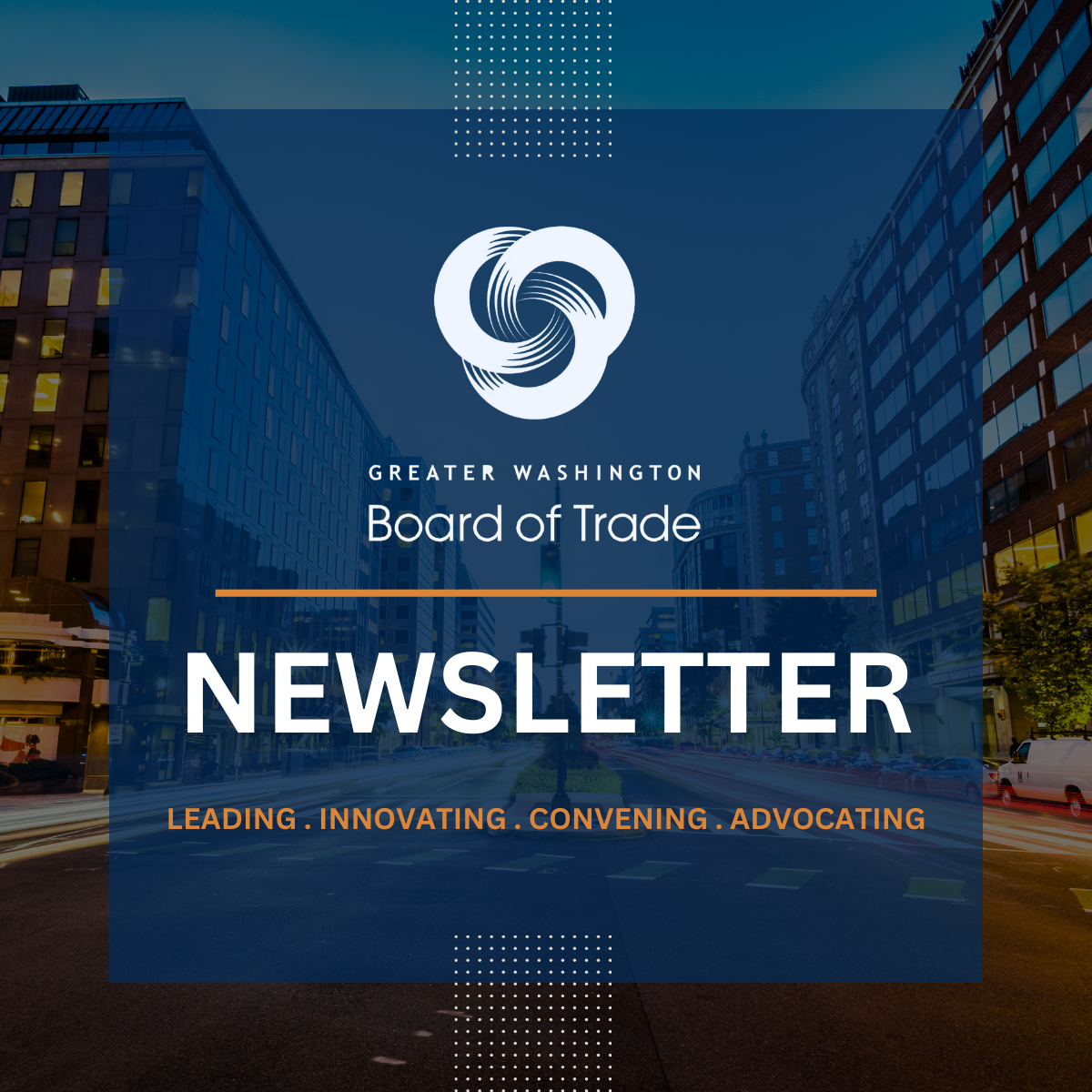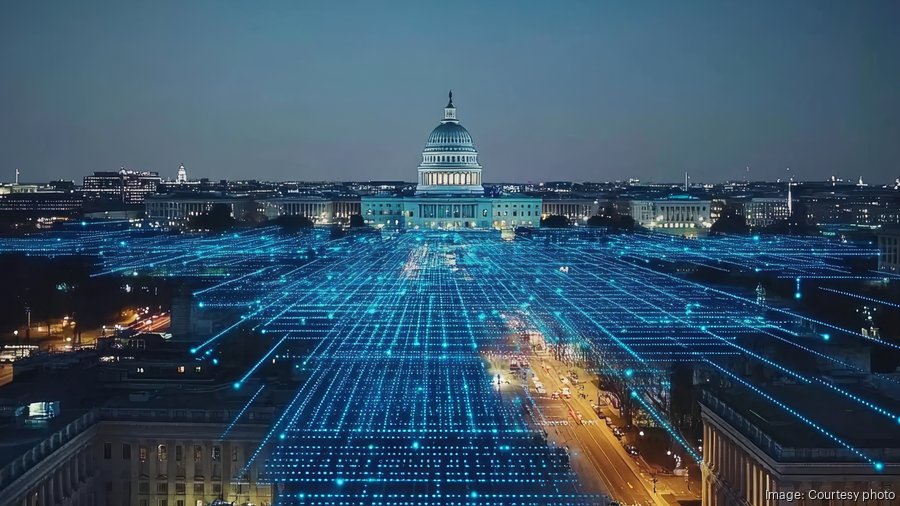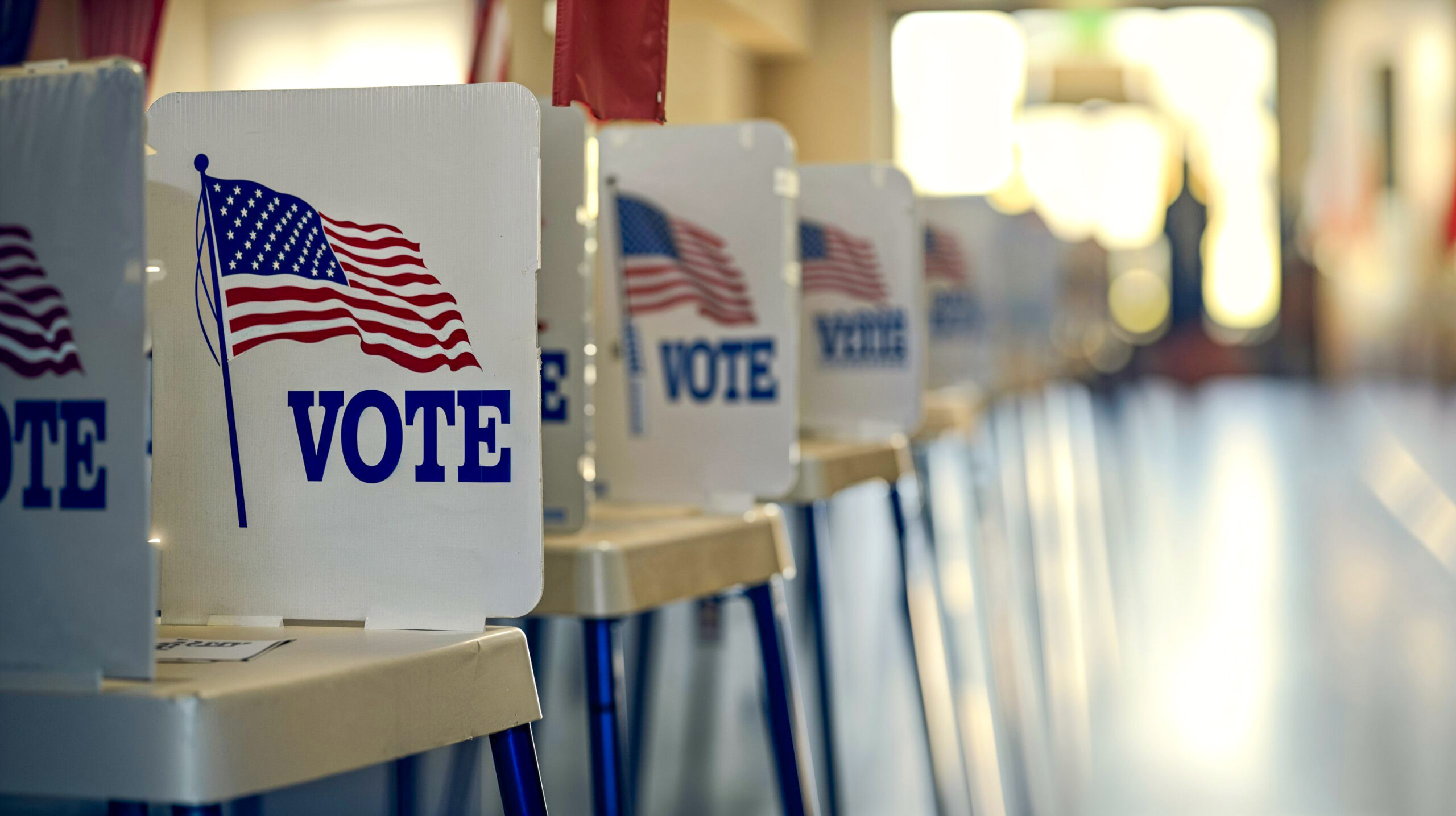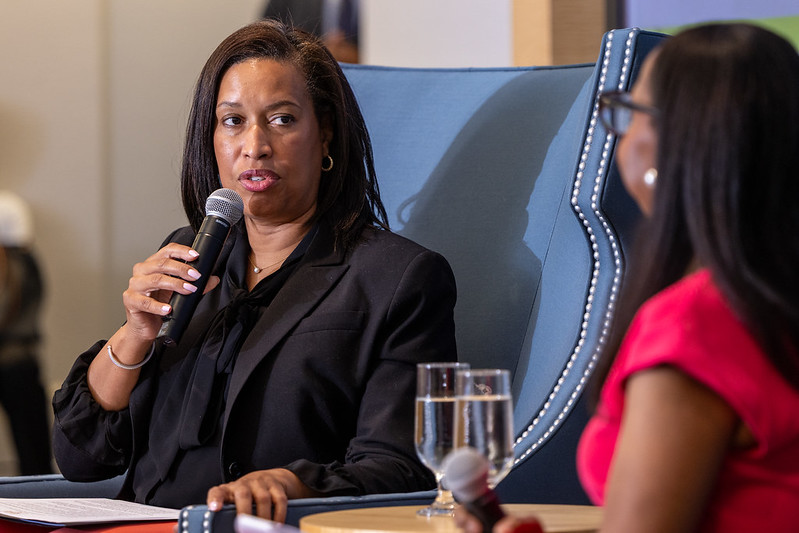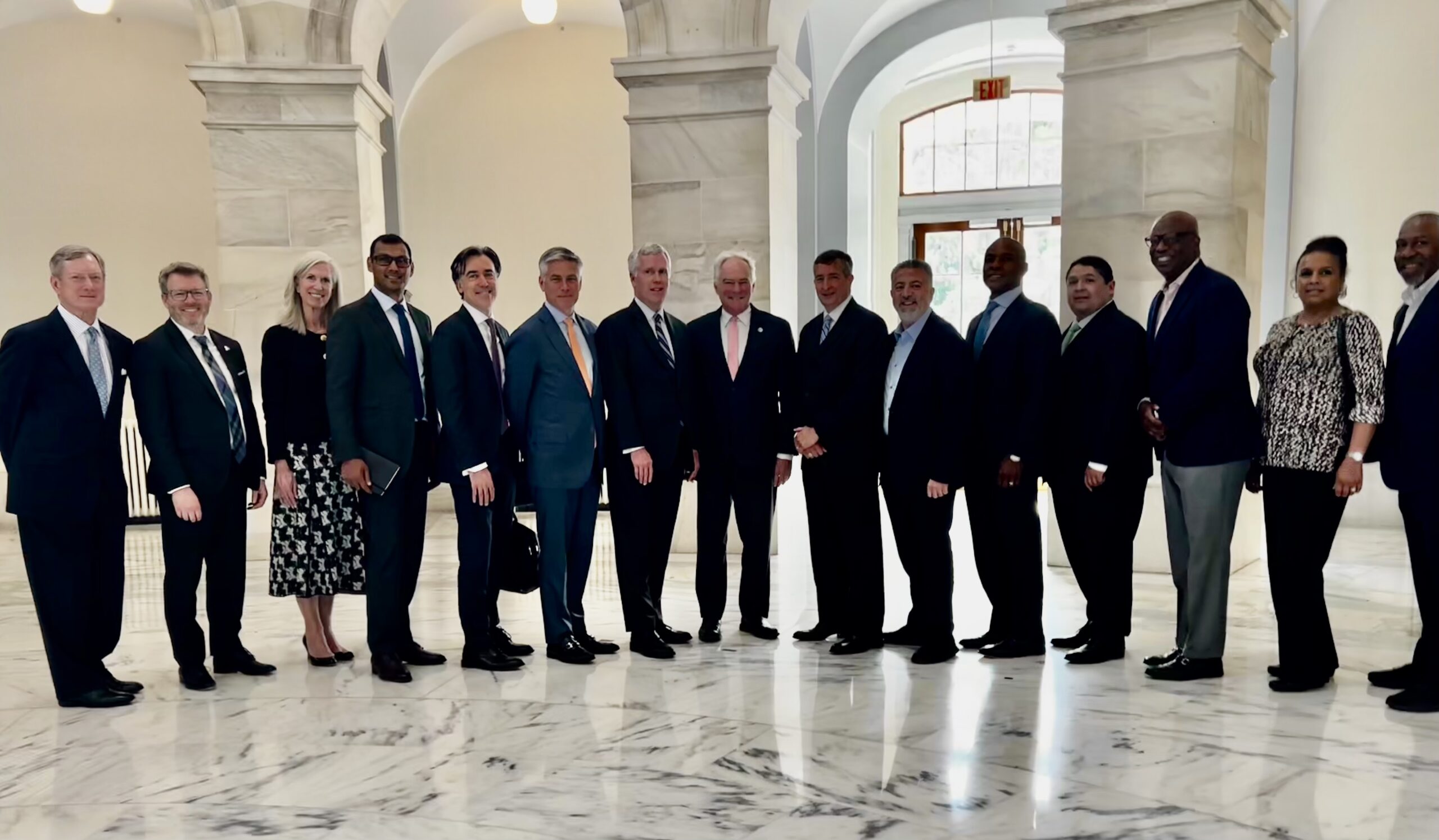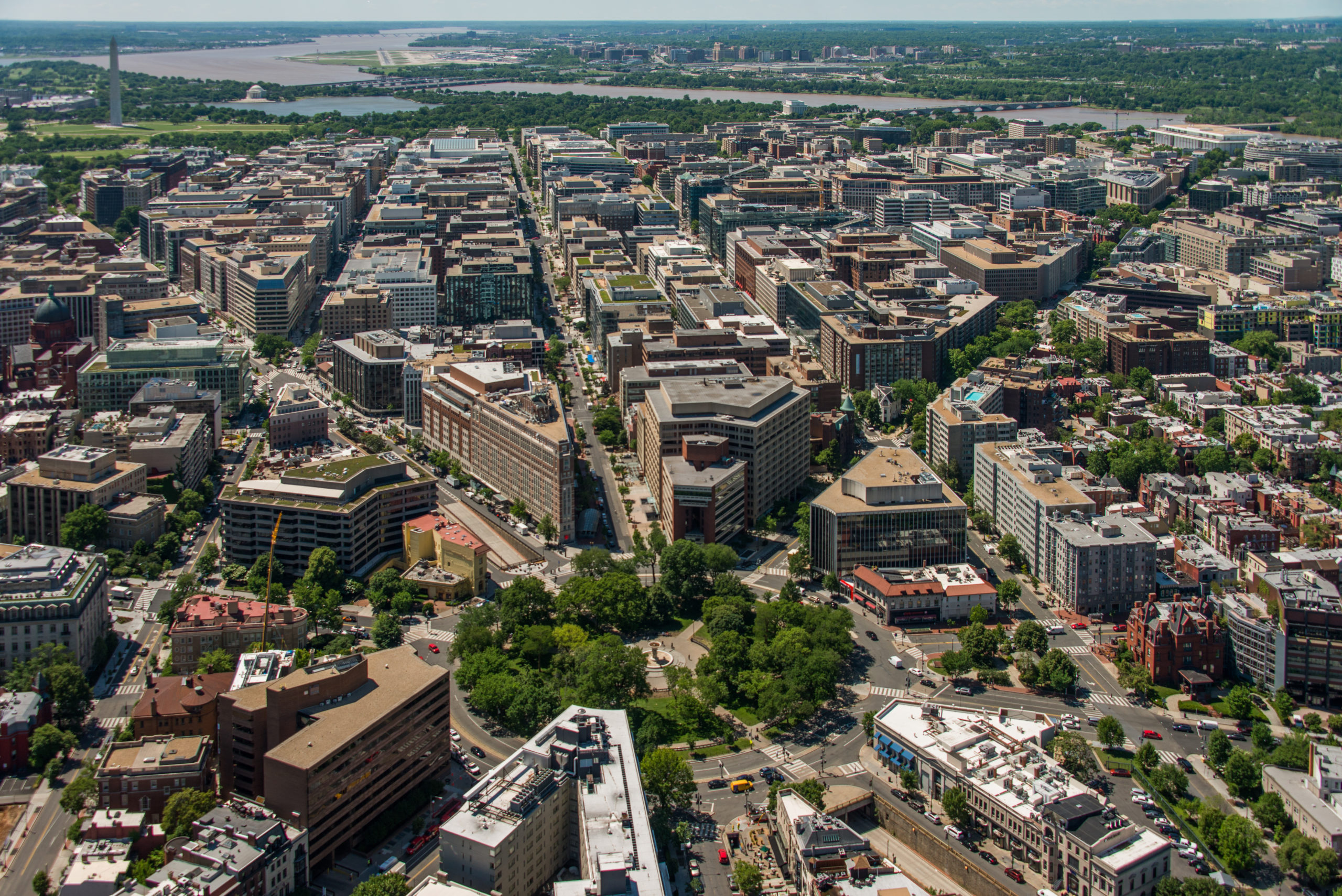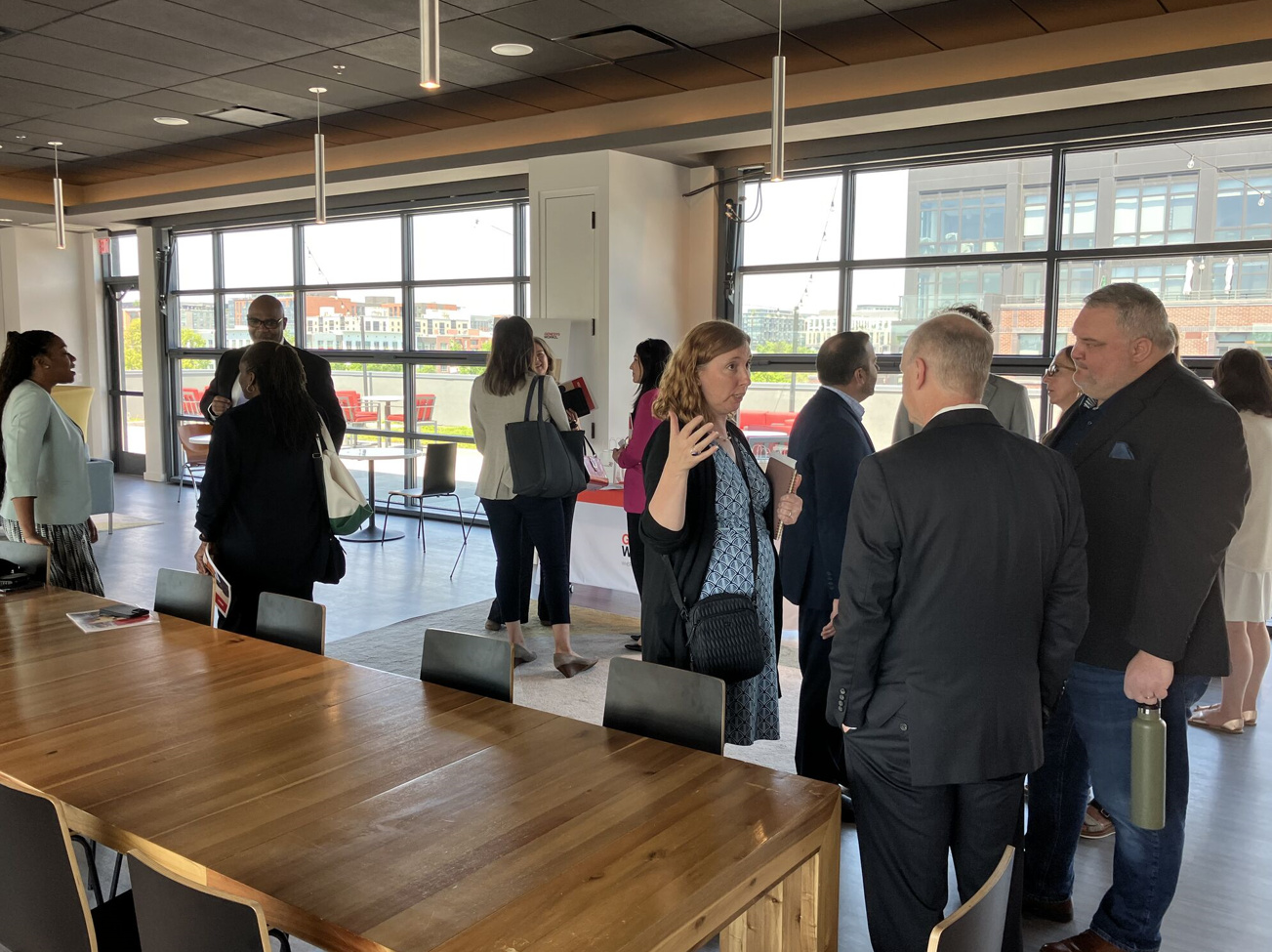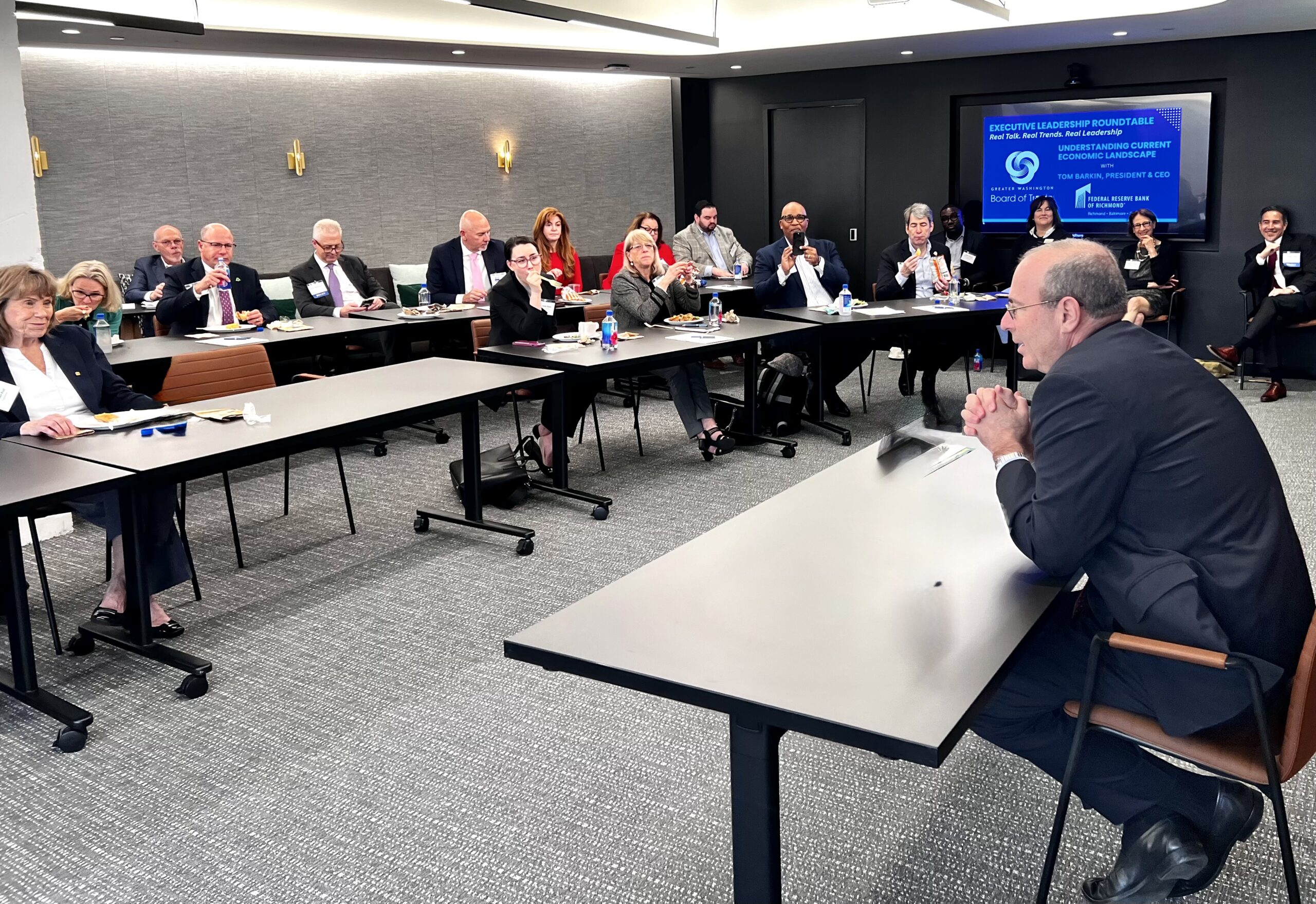The Board of Trade remains focused on advancing the priorities that matter most to Greater Washington. This July newsletter shows a variety of engagements we have had across Greater Washington with members and public officials, while also showcasing meaningful updates on priorities we are following in the region. We also have a variety of member news updates that showcase regional collaboration!
Category: Insights
So Much Power, No Platform: Executive Leaders Discuss Fixing the Disconnect in Regional Progress
The Capital Region stands at a pivotal crossroads. We have all the assets we need to be one of the world’s most competitive, inclusive, and resilient economic hubs — yet we lack the collective operating system to truly activate them.
At the Board of Trade’s recent Executive Leadership Roundtable in partnership with Comcast, leaders across business, education, and civic sectors agreed: Our region is not short on resources. We are rich in capital, talent, innovation, and infrastructure, but these elements operate in silos.
We heard a striking metaphor: “Our region is an app store without an operating system.” We have incredible individual capabilities, but they are not plugged into a cohesive system that drives shared outcomes.
Participants emphasized that to transform, we must:
- Move from a zero-sum mindset to shared growth.
- Align educational and workforce systems with the region’s evolving economic identity.
- Streamline regulatory frameworks to support speed and innovation.
- Shift from process-driven philanthropy to outcome-focused investment.

Inclusion remains a central imperative. With deep disparities in literacy, income, and access to opportunity — for example, 47% of adults in Ward 7 read at a first-grade level — we cannot build a prosperous region without confronting these foundational issues.
As one participant noted, “We have the assets of a Silicon Valley, but not the mindset.” Changing this requires collective vision and action across public and private sectors, underpinned by bold leadership.
Participants explored forward-looking strategies to ensure the Capital Region remains competitive, resilient, and inclusive. Insights from this session will help shape ongoing regional dialogues and inform the collaborative work of the Potomac Conference — a platform designed to synthesize diverse perspectives and surface shared priorities across jurisdictions and sectors.
The time to act is now. We can no longer afford to admire our challenges — we must design, build, and sustain the systems that will define our shared future.
Thank you to Comcast and its government affairs executive, Misty Allen, for partnering and helping us facilitate this discussion. Learn more about the work of Comcast’s Project UP and how this initiative is helping expand internet access around Greater Washington and the United States: https://bit.ly/4lOoMQU
A new identity for Greater Washington: From policy powerhouse to innovation engine | WBJ Viewpoint
From tech talent and research strength to public purpose and inclusive growth, our Greater Washington region has the ingredients to lead as a global innovation powerhouse. But bold coordination is needed.
In his Washington Business Journal viewpoint, our President & CEO, Jack McDougle, highlights the region’s unique advantages—policy expertise, technical talent, and public purpose—and outlines six strategic priorities to turn ambition into impact.
ABOUT THE BOARD OF TRADE
The Greater Washington Board of Trade, founded in 1889, is the region’s premier non-partisan business organization representing industry, nonprofits, universities, and government agencies. The Board of Trade addresses complex and always-evolving business concerns that stretch across the District of Columbia, suburban Maryland and Northern Virginia, with a priority focus on inclusive economic growth, improving the business climate, and enhancing the region’s economic competitiveness.
READ MORE POLICY ISSUES AND TOPICS THE BOARD OF TRADE IS FOLLOWING
- Beyond the Data: 2024 NAEP math results are alarming
- Looking Ahead: The Road to 2025 and Beyound for GWBOT Policy Team
- Virginia gubernatorial candidate Abigail Spanberger meets with Greater Washington’s business community
- Waterway Economics: Funding increases for region’s Post of Baltimore and Port of Virginia
- Testimony: Downtown Arena Revitalization Act of 2024 (DC B25-1004)
New laws in Maryland and Virginia take effect; could impact certain businesses
Between June and July, residents of Maryland and Virginia will see new legislation taking effect across various sectors, which could have a significant impact on businesses, communities, and people traveling between all jurisdictions in the DMV. Here is a look at some of these laws that could impact business owners, regional professionals, and growing communities in the region.
(Washington D.C. laws typically take effect in January. The Board of Trade will continue to proactively monitor the legislation’s impact on business communities in Greater Washington.)
Virginia:
As we head into the summer months, several important new laws will take effect across Virginia, impacting everything from workforce agreements to road safety. These changes reflect the state’s ongoing efforts to protect employees, enhance public safety, and promote fairness in the workplace. These laws discussed below in Virginia take effect on July 1.
Non-Compete Agreements: Expanded Worker Protections
Virginia will prohibit employers from enforcing non-compete clauses with non-exempt employees, those eligible for overtime pay under federal law. This shift is designed to give workers greater freedom to change jobs and encourage a more dynamic labor market. Employers may need to rethink retention strategies in a more mobile and competitive labor market.
Sexual Assault Employer Accountability Act
Another significant change focuses on employer accountability. The Sexual Assault Employer Accountability Act allows victims to hold employers civilly liable for misconduct committed by their employees, especially when vulnerable individuals—such as patients or residents in long-term care—are involved. This law underscores the state’s commitment to protecting those who may be at greater risk and ensuring organizations maintain safe environments. Employers must ensure robust safeguards and oversight in their workplace environments.
Christopher King Backseat Law: Seatbelt Requirement for All Adults
On the road safety front, Virginia is expanding its seatbelt laws to require all adults riding in the backseat to buckle up. Beginning July 1, those who fail to wear a seatbelt in the backseat may face a $25 fine. This measure, known as the Christopher King Backseat Law, is a vital step toward reducing injuries and fatalities on Virginia’s roads. Companies with rideshare programs, shuttle services, or delivery fleets must ensure drivers and passengers follow this law. Businesses may need to incorporate road safety reminders into onboarding or safety briefings. Failure to comply could result in citations that reflect poorly on a company’s safety culture.
Criminal Records Sealing: Supporting Second Chances
The state is advancing criminal justice reform by allowing individuals to petition for the sealing of certain criminal convictions. This change will open doors for many Virginians seeking new employment or housing opportunities, supporting reintegration and second chances. Employers may have less visibility into candidates’ full criminal history, making risk assessment more difficult. Also, employers must ensure hiring decisions don’t discriminate against applicants with sealed records, while still complying with other regulatory requirements.
Maryland:
As of June 1, several new laws are in effect in Maryland that could have a direct impact on businesses—particularly in sectors like energy, tourism, transportation, legal services, and hospitality. This includes new tax changes and rate changes for certain people and businesses.
Maryland Tax Changes
Maryland’s updated budget includes a 3% sales tax on certain tech services—such as data storage—targeted at IT companies. Notably, this tax does not apply to mobile phone services.
The budget also introduces new income tax brackets for top earners: individuals making $500,000 annually will face a 6.25% rate, while those earning $1 million or more will be taxed at 6.5%.
Additionally, a 2% capital gains tax now applies to individuals with incomes over $350,000, and tax rates have increased on both cannabis sales and sports betting.
Next Generation Energy Act
This legislation includes providing two $40 energy rebates to consumers in Fisical Year 2026 and also ends public subsidies for waste-to-energy incinerators, signaling a shift toward more sustainable energy sources. Utilities, energy companies, and large-scale energy consumers should prepare for both administrative burdens around rebates and longer-term transitions in energy policy. This law reinforces Maryland’s move toward greener infrastructure. Businesses with sustainability goals or those operating in the clean energy space may find new opportunities, but traditional energy providers may see changes in incentive structures.
Speed Camera Expansion on I-83
Baltimore City is authorized to double the number of speed cameras on the Jones Falls Expressway (I-83), increasing from 2 to 4. This may seem minor, but for logistics companies or anyone relying on that corridor, increased enforcement can mean higher ticket volumes, stricter route planning, and greater need for driver training. It’s a reminder to prioritize traffic law compliance, especially for regional operations.
Portable Toilet Regulations for Agritourism and Craft Beverage Venues
Wineries, breweries, farms, and other agritourism businesses must now provide portable toilets equipped with soap, clean water, and drying tools. For businesses hosting events, tastings, or public visits, this could mean new capital and operating costs for sanitation equipment, maintenance, and inspections. It also represents Maryland’s continued focus on aligning agritourism with public health standards. If you’re expanding or investing in on-site visitor experiences, this should be part of your planning and permitting strategy.
Abuse Lawsuit Settlement Caps
This law sets financial limits on the amount of damages that can be awarded in abuse-related lawsuits. This is a cap of $400,000 for claims against public institutions and a cap of $700,000 for claims against private entities. Caps on attorney fees will also be set at 20-25%. Organizations, especially schools, nonprofits, religious institutions, and private employers, should take note. These limits may reduce exposure to catastrophic settlements, but they also emphasize the importance of robust internal safeguards, incident reporting mechanisms, and legal risk management practices. While this could offer more predictability in litigation, it won’t replace the need for due diligence and compliance.
Highlighting Results from Virginia’s Primary Races
Virginia’s 2025 primary elections have set the stage for a historic and highly competitive general election in November. This election cycle is particularly historic: both major parties’ gubernatorial nominees are women, ensuring Virginia elects its first female governor. Abigail Spanberger, who secured her party’s nomination unopposed, is a former CIA officer and centrist congresswoman who has emphasized labor rights, paid family leave, and rural outreach as key themes for her campaign. On the Republican side, Winsome Earle‑Sears, a Marine Corps veteran and Virginia’s current lieutenant governor, represents a pro-business conservative alternative and could become the first Black woman to serve as governor in U.S. history.
In the race for attorney general, Democrat Jay Jones, a former state delegate and assistant attorney general, narrowly defeated Henrico County Commonwealth’s Attorney Shannon Taylor in a closely watched primary. Jones, who has emphasized his experience and commitment to challenging federal overreach, will face incumbent Republican Jason Miyares in the general election this fall.
The lieutenant governor race is also poised to be historic as Democrat Ghazala Hashmi, a state senator and former community college administrator, narrowly defeated former Richmond Mayor Levar Stoney in a six-way primary. If elected, Hashmi would become the first Muslim and Indian-American to hold statewide office in Virginia. She will face Republican John Reid, a conservative radio host and former communications director, who became the GOP nominee after his opponent withdrew from the race.
These developments mark a significant moment in Virginia’s political landscape, with both parties fielding diverse and accomplished candidates for the state’s top offices. As the general election approaches, all eyes will be on Virginia to see how these historic candidacies influence voter turnout and the broader political climate.
More Quick Info About Upcoming Elections in Virginia:
- Election Day in Virginia: Tuesday, November 4th. Early in-person voting begins on September 19th, and individuals can register to vote or update their existing registration online through October 14th. Learn more here.
- A Special Election will be held on September 9th for Virginia’s 11th District U.S. House seat. Early voting for this election will start on July 25th.
- To see where you should vote if you live in Virginia, click here.
Investing in What Works: Mayor Bowser on Building a Smarter, Stronger DC
As Greater Washington navigates rapid economic change and shifting federal dynamics, the Greater Washington Board of Trade convened a timely and candid conversation with D.C. Mayor Muriel Bowser on June 12, 2025. The fireside chat, hosted in partnership with Holland & Knight LLP and moderated by Executive Partner Janene Jackson, brought together leaders across sectors to explore the District’s fiscal outlook, strategic investments, and long-term vision for inclusive growth.
Mayor Bowser addressed the District’s most pressing economic challenges, including a projected $1 billion revenue shortfall over the next four years, driven largely by anticipated federal workforce reductions. Despite this difficult terrain, she reaffirmed her commitment to a growth-oriented budget.
“We’re right-sizing our spending and growing our revenue, with no new taxes,” Mayor Bowser said. “We have to grow our economy, diversify our base, and help D.C. residents transition into new, high-quality jobs.”
Driving Strategic Investment Across the City
Throughout the conversation, Mayor Bowser outlined key priorities from her FY26 budget and Budget Support Act, emphasizing investments that modernize systems, expand opportunity, and maintain the District’s economic resilience:
- Tech Ecosystem Growth – A new Technology Ecosystem Fund and reviving parts of the Qualified High-Tech Company Incentive are designed to attract startups and scale-ups, leveraging the region’s tech talent and strengthening D.C.’s competitiveness as a center for innovation.
- Workforce Mobility – Investments in career and technical education, the DC Infrastructure Academy, and expanded procurement for local businesses aim to create upward mobility—particularly for residents in Wards 5, 7, and 8. Since 2015, the District’s spending with D.C.-based businesses has grown from $300 million to over $1.5 billion annually.
- Downtown Revitalization – The FY26 budget includes $17 million for public spaces, including the Gallery Square project and the revitalization of Farragut Square, McPherson Square, and Lafayette Park, part of a broader strategy to draw new investment, foot traffic, and vibrancy to downtown.
- Housing & Rental Reform – Mayor Bowser reaffirmed her commitment to affordable housing production while advocating for reforms to the Tenant Opportunity to Purchase Act (TOPA) and pandemic-era rental policies to stabilize D.C.’s housing ecosystem and re-attract capital investment.
- Public Safety & Infrastructure Modernization – New funding for 911 infrastructure (including a commitment to its updated and remodeled 2nd 911 Call Center), law enforcement drones, and asset lifecycle planning is part of a citywide push to modernize public services and ensure a safe, reliable foundation for growth.
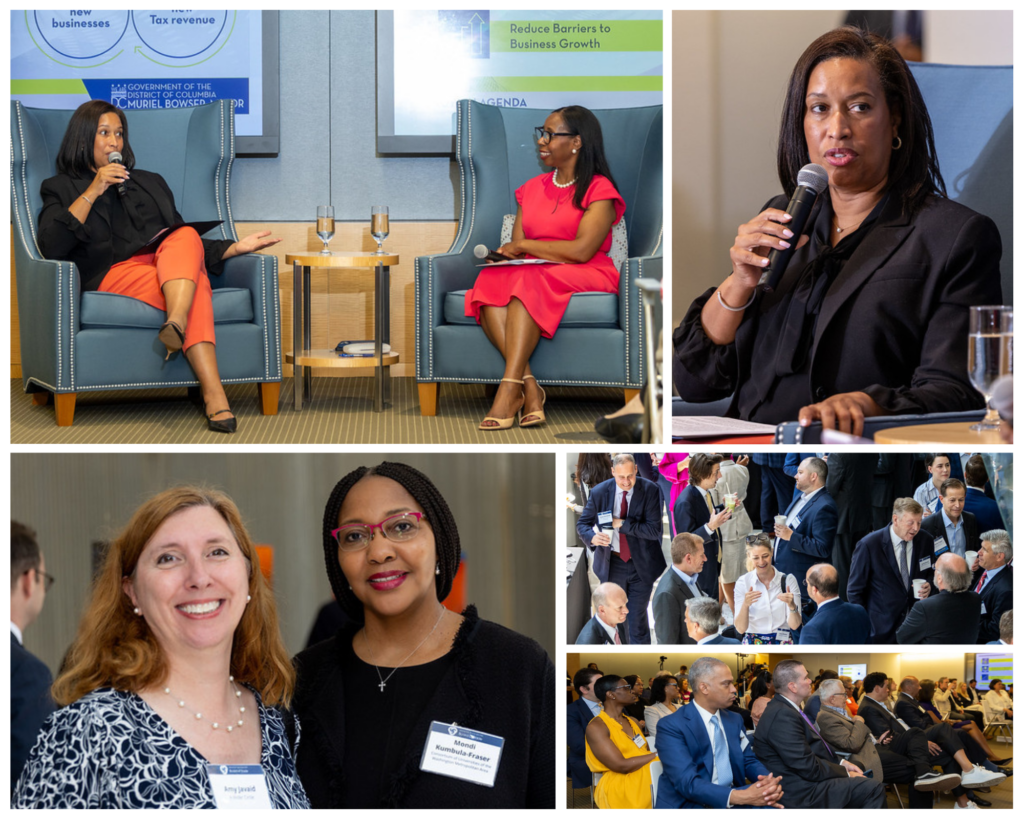
VIEW MORE PHOTOS FROM THIS EVENT
The Future of RFK and Federal Alignment
Mayor Bowser also offered a bold vision for the RFK Stadium site—a catalytic 180-acre redevelopment opportunity that would include a new stadium, mixed-use housing, recreation space, and an entertainment district along the Anacostia River.
“If it was just a stadium, we wouldn’t be as interested,” she noted. “This is about unlocking the full potential of the site—for our residents and for the future of the city.”
Turning to federal workforce and infrastructure policy, Mayor Bowser emphasized the importance of regional alignment and cross-jurisdictional collaboration. She called on public and private leaders to push for federal reinvestment and a renewed commitment to in-person work in the capital.
A Call to Action for the Business Community
The session concluded with a direct message to business and civic leaders: remain engaged, advocate for change, and help move the District’s growth agenda forward.
“Don’t bet against the District,” Mayor Bowser said. “But don’t sit on the sidelines either. If we’re still having this conversation next year and haven’t made progress—shame on us.”
This special session is part of the Board of Trade’s broader mission to shape a next-generation regional economy—one built on digital transformation, inclusive growth, and stronger public-private partnerships. We extend our deep thanks to Mayor Bowser for her continued leadership, and to Holland & Knight and Janene Jackson for making this powerful dialogue possible.
Watch the whole conversation between Mayor Bowser and the Board of Trade below:
A Strategic Conversation with Senator Tim Kaine: Building the Capital Region’s Next Economy
Amid rapid disruption and shifting federal priorities, Virginia Senator Tim Kaine convened the Greater Washington Board of Trade and a select group of regional leaders for a private roundtable focused on the Capital Region’s economic future. Held June 2 in the Russell Senate Office Building and co-hosted with Fox Rothschild LLP, the closed-door session explored how business and government leaders can collaborate to strengthen Greater Washington’s competitiveness in a time of accelerating change.
With participants representing sectors such as transportation, energy, infrastructure, and workforce development, the session served as a unique forum for candid, solution-oriented dialogue.
A Regional Approach to a Shared Future
Senator Kaine emphasized the need for stronger collaboration across D.C., Maryland, and Virginia to better position the region as a unified economic force. He encouraged business leaders to identify actionable, cross-jurisdictional priorities that could be brought to the attention of Virginia’s congressional delegation, which meets monthly and has a strong track record of bipartisan alignment on economic development.
Kaine also acknowledged the ongoing efforts of organizations like the Board of Trade and the Council of Governments to promote regional thinking, noting that “residents don’t see regionalism, but they live it.” His remark underscored the urgency of aligning across state lines to address shared challenges and opportunities.
Innovation, Infrastructure, and the Shift from Federal Dependency
The conversation addressed the region’s reliance on federal spending and the importance of accelerating the transition to a more innovation-driven economy. Participants highlighted the challenges facing midsize firms trying to scale, the need for accessible capital, and gaps in commercialization pathways for startups.
Senator Kaine underscored the importance of infrastructure investment, including energy and transit, as foundational to future economic growth. He also pointed to the federal government’s role in helping states and localities better connect workers, including veterans, to emerging industries.
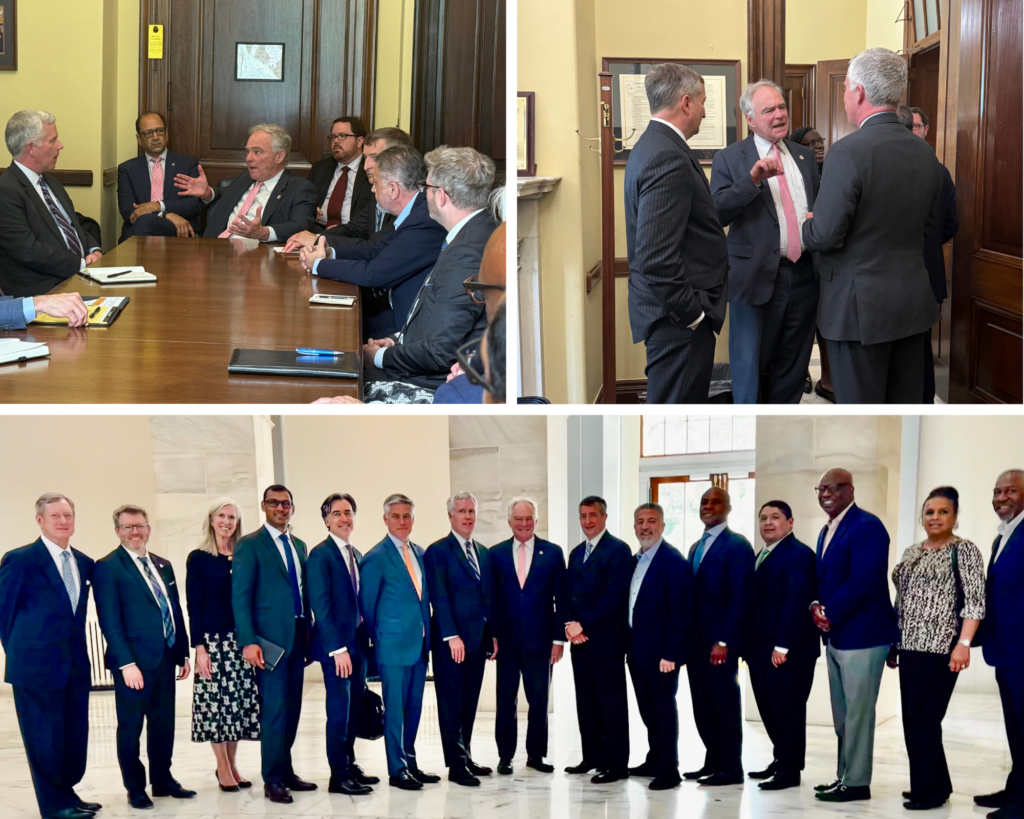
VIEW MORE PHOTOS FROM THIS EVENT
Retaining Talent in a Changing Economy
A recurring theme was the imperative to attract and retain top talent. Senator Kaine noted that workforce retention is one of his top concerns and encouraged strategies that span early childhood education, advanced degree pathways, and credential transfer for military spouses and professionals.
“There are a lot of talented people in this region,” Kaine said. “The question is whether we are giving them reasons—and the ability—to stay.”
Leaders also discussed how unpredictable commuting patterns, housing affordability, and the mass layoff of federal workers are compounding talent challenges. Senator Kaine encouraged federal-regional alignment on solutions and noted that Greater Washington must continue building the case as a modern hub of innovation, not just governance.
From Dialogue to Strategy
The Board of Trade will continue to elevate regional voices and connect them with policymakers to drive tangible outcomes. As Senator Kaine noted, this moment presents both disruption and opportunity—and it will take collective action to shape what comes next.
Across initiatives like the Potomac Conference, DMVMoves, and our work on innovation and workforce transformation, we are helping the region transition from federal dependency to a more diverse, digitally enabled economy. Our strategy is grounded in the belief that Greater Washington can lead—by aligning across jurisdictions, investing in modern infrastructure, and unlocking the full potential of our people.
As federal priorities shift and technology accelerates change, we invite leaders across all sectors to engage with us. Together, we can build a stronger, more resilient Capital Region—one that defines the next era of American economic leadership.
We extend our sincere thanks to Fox Rothschild LLP and their partner, Reggie Jones, for their continued support of the Board of Trade’s policy programming. Additionally, we’d like to thank our Virginia policy advisor, Hon. David Ramadan, Ed.D. of RAMA International Inc., for their instrumental support in coordinating this engagement with Senator Kaine and helping shape the discussion.
A new era for Greater Washington: Leading the digital economy | WBJ Viewpoint
Greater Washington is poised to lead the digital economy—if we seize the moment.
In a new piece for the Washington Business Journal, our President & CEO, Jack McDougle, outlines a bold vision for our region’s future.
As federal priorities shift and technology accelerates, Greater Washington has the assets to lead in industry sectors such as cybersecurity, bio-health, quantum computing, and a globally competitive workforce. But we need bold collaboration to modernize education, scale clean energy, and align around shared priorities.
ABOUT THE BOARD OF TRADE
The Greater Washington Board of Trade, founded in 1889, is the region’s premier non-partisan business organization representing industry, nonprofits, universities, and government agencies. The Board of Trade addresses complex and always-evolving business concerns that stretch across the District of Columbia, suburban Maryland and Northern Virginia, with a priority focus on inclusive economic growth, improving the business climate, and enhancing the region’s economic competitiveness.
READ MORE POLICY ISSUES AND TOPICS THE BOARD OF TRADE IS FOLLOWING
- Beyond the Data: 2024 NAEP math results are alarming
- Looking Ahead: The Road to 2025 and Beyound for GWBOT Policy Team
- Virginia gubernatorial candidate Abigail Spanberger meets with Greater Washington’s business community
- Waterway Economics: Funding increases for region’s Post of Baltimore and Port of Virginia
- Testimony: Downtown Arena Revitalization Act of 2024 (DC B25-1004)
What We’re Learning from Regional Leaders About the Path Forward | Executive Lunch Series Insights
In a time of rapid transformation, the Greater Washington Board of Trade has continued to bring together executive leaders across sectors to explore what it will take to shape a more resilient, competitive, and connected regional economy.
Through a series of executive lunches this spring, we’ve heard directly from those leading the charge—on the ground, in the boardroom, and across our communities. From energy and transportation infrastructure to education, capital access, and wellness, the discussions have revealed a shared urgency and a growing consensus: Greater Washington is at a defining moment, and the path forward depends on bold collaboration across business, academia, and government.
A Region Ready for Reinvention
Whether we’re talking about reshaping our education system or rethinking how we power the future, the message from leaders has been consistent: incremental change is no longer enough.
Anne Khademian, Executive Director of the Universities at Shady Grove, highlighted how public trust in higher education has declined even as workforce expectations have risen. She emphasized the need for new models that align institutional goals with learner outcomes and employer needs that bring business, government, and academia together around a shared vision for talent development.
That same spirit of shared responsibility came through in our workforce-focused conversation with Selvon Waldron, Executive Director of Genesys Works. He underscored the importance of early exposure to opportunity and the role that employers can play in building more inclusive pipelines for the next generation of talent.
Creating the Conditions for Inclusive Growth
As we navigate rising costs, new technologies, and evolving labor dynamics, the conditions that support business success are shifting.
At our session focused on capital access, we heard from market presidents of banks across the region who stressed the importance of flexible financing tools, local partnerships, and intentional strategies to direct capital where it can make the biggest impact, especially in underserved communities.
And in our lunch exploring health and wellness as a strategic business asset, Shannan Herbert, CEO of WACIF, made a powerful case for viewing wellness as a long-term investment. Not just in productivity, but in culture, retention, and community well-being.
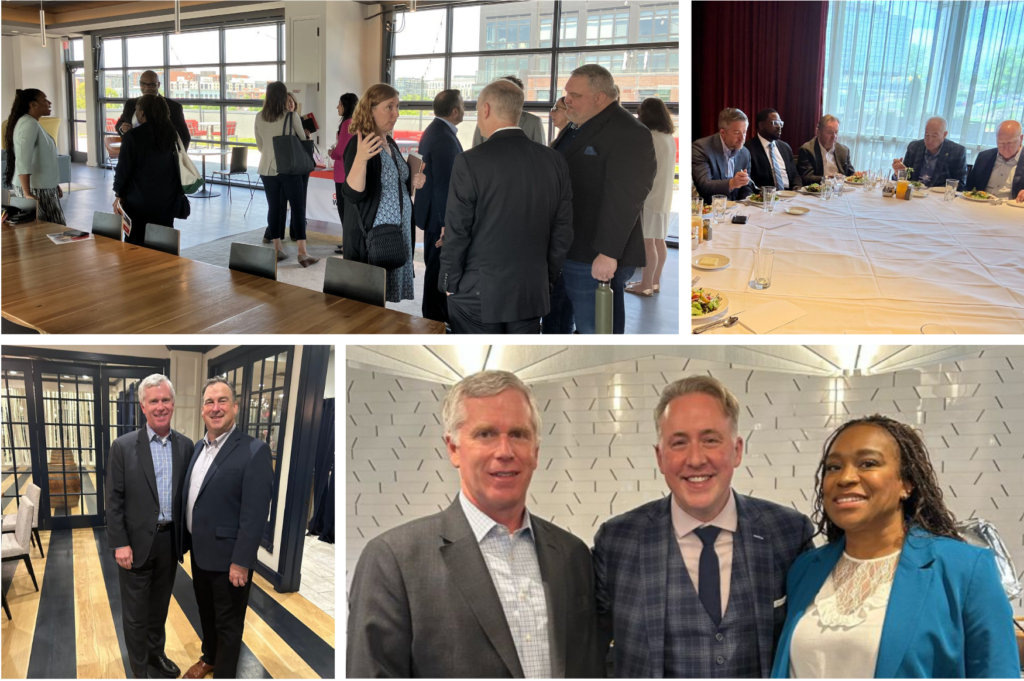
Catalyzing Regional Momentum
Across these conversations, the role of infrastructure—physical and institutional—has been front and center. At our session on the economic impact of sports, JJ Rivers of Gensler shared how thoughtful sports development projects can revitalize neighborhoods, generate new business activity, and help rebrand DC as a premier destination for both fans and investors. Projects like the Capital One Arena redevelopment are not just entertainment upgrades—they are economic engines.
And in our session on regional mobility, hosted in partnership with United Airlines, we explored how connectivity—from airports to data systems—drives business growth, talent movement, and broader economic sustainability.
Leading Through Change
We’ve also heard directly from executives navigating change in real time. Conversations on leadership, innovation, and economic resilience made clear that today’s environment demands more than strategic planning, which calls for adaptability, transparency, and the ability to unify teams and stakeholders around a shared purpose.
What’s Next
Greater Washington has the talent, institutions, and access to lead on the national and global stage but doing so will require us to align more deeply, act more boldly, and collaborate more consistently. These executive lunches aren’t just about sharing insights; they’re about catalyzing action.
We’ll continue bringing leaders together to shape what’s next for our region, our economy, and our shared future.
Thank you to Genesys Works and United Airlines for sponsoring lunches that highlight these important discussions and help to shape the dialogue.
Executive Leadership Roundtable Recap: Leaders Respond to a Changing Economy
On May 9 at our Downtown D.C. office, the Greater Washington Board of Trade convened a candid Executive Leadership Roundtable with Tom Barkin, President & CEO of the Federal Reserve Bank of Richmond. This session brought together senior executives from across the region for an exchange on national economic trends, regional business conditions, and the future of our workforce and markets.
Our members brought candor, insight, and urgency to the conversation, reflecting the realities of leading through disruption. While the economic data offers mixed signals, business leaders are navigating real-time volatility in pricing, hiring, trade policy, and consumer behavior. The conversation underscored that conventional playbooks no longer apply in the same ways, and leaders must adapt to a system defined by speed, decentralization, and growing complexity.
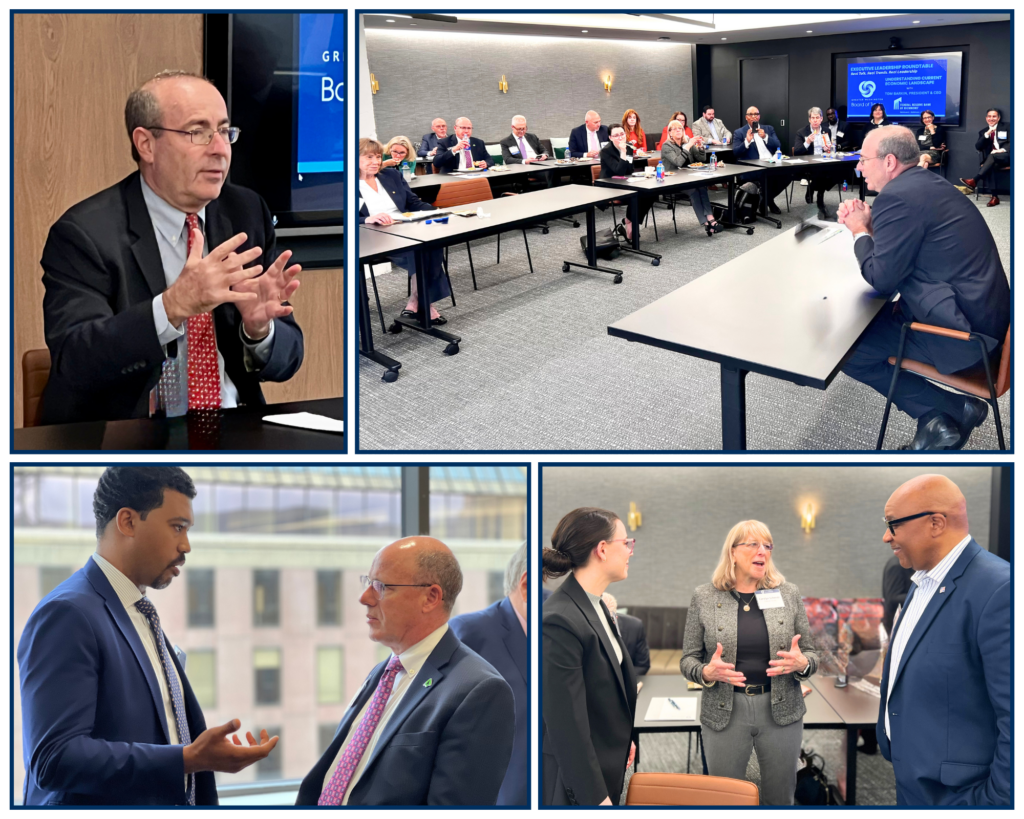
Several recurring themes emerged:
- Persistent labor shortages—not just in volume, but in skills alignment
- Rising operating costs and uncertainty around tariffs, housing, and energy
- The growing impact of AI and automation across internal operations
- A shared desire for better federal-local alignment in economic response
- The importance of timely, trusted data to supplement lagging indicators
The conversation reinforced a critical truth: Greater Washington cannot afford to plan for the economy of the past. Across sectors, leaders are grappling with systems and structures that were built for another era. What’s needed now is not only new solutions, but new ways of thinking.
The Board of Trade will continue to foster these executive-level dialogues, providing space for leaders to test assumptions, exchange strategies, and shape a more resilient, competitive region.
Mark your calendar: Our next Executive Leadership Roundtable with Tom Barkin will take place on October 17. Registration details will be shared soon—stay tuned.
Thank you to the Federal Reserve Bank of Richmond for sponsoring this vital discussion that engages our members and partners in the region.

